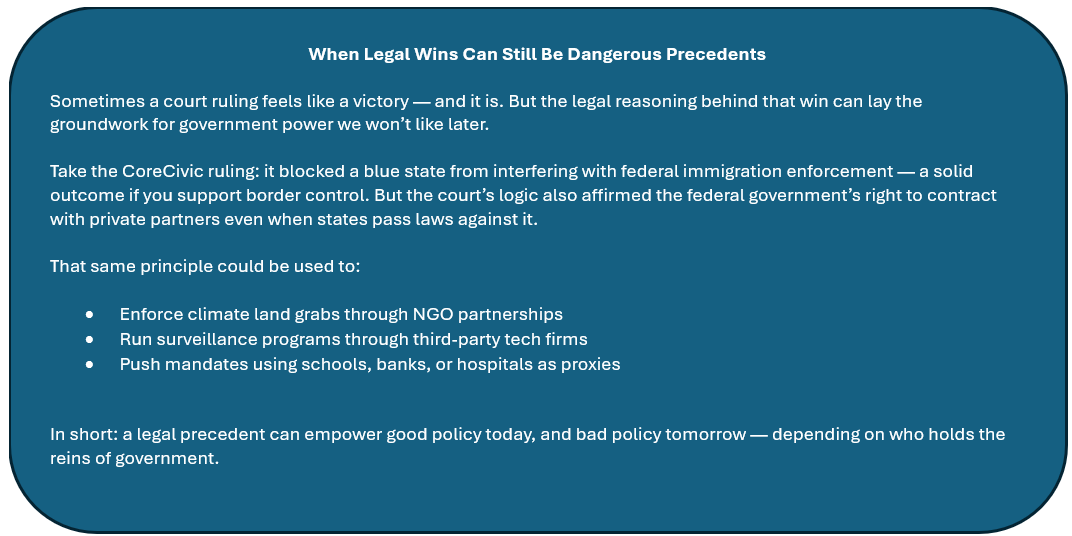Contracting Around the Constitution: How the Federal Government Outsources Power Without Accountability
The Quiet Expansion of Federal Power
Hi friends,
For years our federal government has been using contracted entities to do the ‘work’ that is forbidden to the government entities. This creates a partnership of sorts. This partnership allows the government to accomplish it’s unconstitutional actions by a loophole. The government isn’t actually doing the dirty work, so they are not breaking any rules, regulations, or laws. They do, however, end up with the results as if they had gone beyond what is ‘allowed’. Hm, what’s that saying about the letter of the law vs the intent of the law? This has not been a secret for a long time; it’s very open.
In fact, it seems to me that they get more bold and aggressive as time goes by.
Below is a bit about how ‘our’ government accomplishes some of these things.
Eminent domain is another use that is often accomplished by these public-private partnerships.
The federal government is bound by the Constitution. At least, that’s how it’s supposed to work. But over the last several decades — and especially in the post-9/11 and COVID eras — a troubling trend has emerged: outsourcing federal authority to private contractors in ways that appear to sidestep constitutional limits, Congressional oversight, and public accountability.
This tactic, often buried in the bureaucratic language of “public-private partnerships” (PPPs), has allowed unelected agencies to do through third parties what they could never do directly — and that should concern every American, regardless of political party.
What Does “Contracting Around the Constitution” Mean?
At its core, the phrase refers to government agencies contracting with private actors — corporations, nonprofits, academic institutions, or international partners — to implement policies, gather data, or restrict behaviors that the government itself would face legal limits doing.
Because these partners aren’t technically the government, they’re not always held to:
First Amendment (free speech and censorship limits)
Fourth Amendment (search and seizure)
Due process requirements
FOIA and transparency laws
Congressional budget controls
Real-World Examples
Let’s look at what this has meant in practice:
1. Social Media Censorship via NGOs
The federal government has funded or partnered with entities like:
Stanford Internet Observatory
The Election Integrity Partnership
Center for Internet Security (CIS)
…to pressure platforms like Twitter and Facebook to remove content. These third parties acted as intermediaries between DHS, CISA, or the FBI — giving the government plausible deniability that it was censoring speech.
[See also: Missouri v. Biden and the Twitter Files.]
2. Immigration Detention & Surveillance
Companies like CoreCivic and GEO Group operate federal immigration detention centers and deportation programs. In some cases, these arrangements violate state laws — yet courts (as in the July 2025 CoreCivic v. New Jersey ruling) upheld the federal government’s right to use private contractors even when the state objected.
States can’t block detention facilities, even when they ban private prisons. That ruling and others confirm it.
3. Public Health Mandates Through Employers
The federal government incentivized (or pressured) private companies, hospitals, and universities to enforce:
Vaccine mandates
Mask policies
Travel restrictions
This allowed agencies to enforce de facto mandates without passing enforceable laws or regulations, while avoiding court review of constitutional claims.
4. Land Use, Property Rights & “Conservation”
Through the 30x30 initiative and various USDA/Interior grant programs, the federal government funds environmental NGOs and land trusts to acquire, restrict, or “retire” land — in some cases without triggering eminent domain protections.
You can’t sue the federal government for a taking if the land is technically acquired by a nonprofit or other ‘partner’.
5. National Surveillance Outsourced to Contractors
Contractors like Palantir, Booz Allen, and Amazon Web Services have built data systems used by DHS, FBI, and the Pentagon — sometimes storing vast amounts of U.S. citizen data.
Because the data isn’t directly held by a government agency, citizens have fewer legal paths to challenge access, collection, or misuse. Does it make you think of the shell game?
How They Get Away With It
1. State Action Doctrine Loophole
Private partners are not always considered “state actors,” meaning constitutional protections may not apply.
2. FOIA and Oversight Evasion
Private partners don’t fall under FOIA in most cases, even when carrying out public functions — shielding records from public scrutiny.
3. Judicial Deference
Courts often defer to executive discretion in national security, public health, and immigration — and look the other way when third-party contractors are involved.
The End Result?
Government gains power.
Citizens lose protections.
Private entities profit.
Transparency vanishes.
All while the original constitutional protections remain technically “intact.”
Bottom Line: This Isn’t a Bug — It’s a Feature
This trend didn’t happen by accident. It has evolved across both Republican and Democratic administrations. The appeal is obvious: third-party implementation of controversial or constitutionally sensitive programs makes it easier to avoid legal challenges and political backlash.
But Americans are catching on. From school boards to state legislatures to the Supreme Court, pushback is growing. The question is can citizens win this battle.
Additional Sources:
https://harvardlawreview.org/print/vol-135/geo-group-inc-v-newsom/
https://cdn.ca9.uscourts.gov/datastore/opinions/2022/09/26/20-56172.pdf
God bless you, God bless President Trump and team, and God bless America!
The battle for our God-given freedoms is always just starting.
Subscribe at RationalAmerican.org for more facts, insights, and uncensored commentary.
As always, do your own research; make up your own mind.
This Substack is provided for informational and commentary purposes only. All claims are based on publicly available sources and are presented as political analysis, not legal conclusions. No assertion is made of unlawful conduct by any individual or organization unless supported by formal public record.
The views expressed reflect my personal perspective on current events. While I strive for accuracy, readers are encouraged to verify details using the official sources linked above. References to third-party material are included for your consideration and do not necessarily reflect my views or imply endorsement.
If you share this content, please include this disclaimer to ensure appropriate context and clarity.
(AI may have been used in this article.)
Stay calm - President Trump is a businessman who operates strategically, and not everything will make sense at first. His plan to shrink government and Make America Great Again is a process, not an overnight fix. Trust the long game, not just the headlines.
United we stand. Divided we fall. We must not let America fall.
VoteTexas.gov, https://www.votetexas.gov/get-involved/index.html
Until next time…
Please share your thoughts in the comments. Or email me, and let’s have a problem-solving conversation. I hope we can create a caucus with positive, back-to-the-founders’-dream-for-America results. Have a topic you want to know more about?
Some housekeeping…
Going forward, you may need to check your spam folder. And please mark this address as ‘not spam.’ If the newsletter isn’t in your spam folder either, you should look in the Promotions tab.
You can always see everything on the website, RationalAmerican.org.
Thanks again for reading! I’m glad you’re here!


